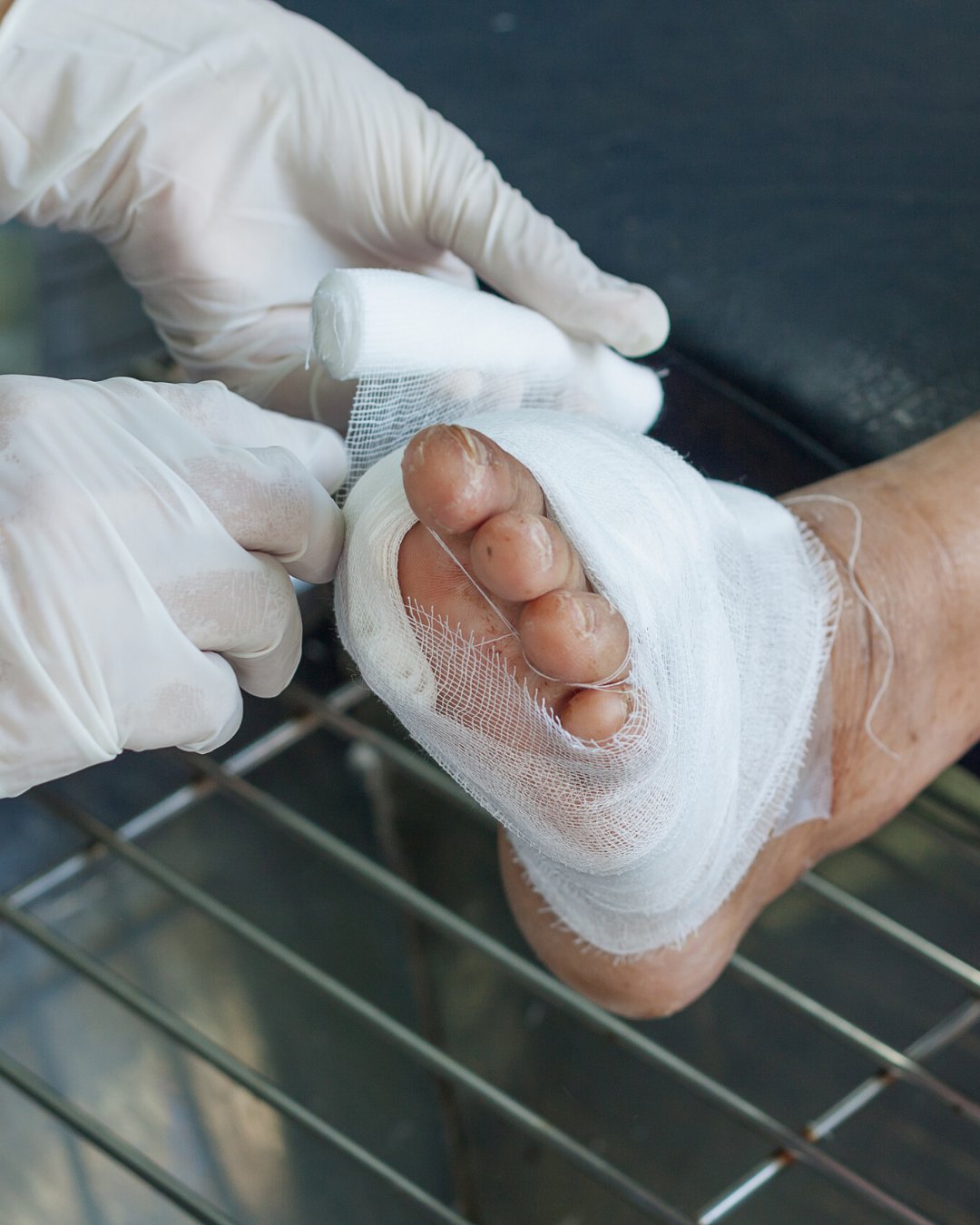Diabetic Foot Ulcer Specialist in Marietta, GA
Serving Northwest Metro Atlanta
Diabetic Foot Ulcer Care
We understand that dealing with diabetic wounds, especially diabetic ulcers, that won’t heal can be difficult for patients and their families. We know managing wound care and monitoring your insulin and blood sugar can be complicated. Anodnye Pain and Health Group can help.
A diabetic ulcer is a sore or open wound commonly occurring in individuals with diabetes, particularly on the foot. These ulcers are a major complication of diabetes. They are primarily caused by poor blood circulation and neuropathy (nerve damage) in the feet, which can result from uncontrolled blood sugar levels over time.
Symptoms of diabetic ulcers
Location: They most often occur on the bottom of the foot.
Neuropathy: Diabetes can cause nerve damage, leading to a loss of sensation in the feet. As a result, cuts, sores, or blisters may go unnoticed and worsen over time.
Poor Circulation: Diabetes affects blood circulation, slowing down the healing process of wounds. This makes the body less effective at fighting infections, turning a small wound into a serious complication.
Infection Risk: Ulcers can become easily infected, and these infections can develop quickly. In severe cases, this can lead to gangrene or the need for amputation.
Prevention and Care: Regular foot examinations, good foot hygiene, and controlling blood sugar levels are crucial in preventing ulcers. Prompt and proper care is essential to prevent complications if an ulcer develops.
It’s important for individuals with diabetes to regularly inspect their feet for any signs of ulcers and to seek medical attention if an ulcer or any abnormality is discovered. The treatment of diabetic ulcers often involves a multidisciplinary approach, including controlling blood sugar levels, using medications, proper wound care, and possibly surgery.

Do I Need Wound Care Treatment for a Diabetic Foot Ulcer?
Expertise in Complex Wounds: Wound care specialists have expertise in treating complex wounds, like diabetic ulcers, which often require specialized knowledge and techniques. They are trained to manage various aspects of wound healing, including infection control, moisture balance, and tissue regeneration.
Prevention of Infections and Complications: Diabetic ulcers can easily become infected, leading to more severe complications like gangrene or the need for amputation. A wound care specialist can help prevent these serious outcomes by providing appropriate care and monitoring the wound’s progress.
Customized Treatment Plans: Each case of a diabetic ulcer can be unique, depending on its location, depth, and the patient’s overall health. A wound care specialist can create a customized treatment plan that addresses these factors, including advanced technologies such as skin grafts.
Management of Underlying Diabetes: Effective management of the underlying diabetes is crucial in healing a diabetic ulcer. Wound care specialists often work closely with other healthcare providers, such as endocrinologists, to ensure that the patient’s diabetes is under optimal control, which is vital for wound healing.
Education and Prevention: Wound care specialists also educate patients on proper foot care, nutrition, and lifestyle changes to prevent new ulcers from developing. This education is crucial for patients with diabetes, as they are at a higher risk of developing additional ulcers in the future.
Use of Advanced Technologies: These specialists often have access to advanced wound care technologies and treatments that might not be available in a general healthcare setting. This includes the latest wound dressings, advanced skin grafts, and other innovative treatments that can accelerate healing.
What’s the Prognosis of an Untreated Diabetic Ulcer?
Infection: Without proper care, an ulcer can become infected. Diabetic individuals often have reduced sensation in their feet, so they might not initially feel the pain of an infection. Infections can worsen quickly and can spread to deeper tissues, including muscles and bones.
Gangrene: This is a condition where the tissue dies due to a lack of blood flow. If an ulcer becomes severely infected and the infection impedes blood flow, it can lead to gangrene. In severe cases, this might necessitate amputation to prevent the spread of infection.
Charcot Foot: A less common but serious complication is Charcot foot, where the bones in the foot weaken and fracture, leading to deformities. Ulcers and poor wound care can exacerbate this condition.
Amputation: In severe cases, particularly when infection is not controlled or it leads to extensive tissue death, amputation of the toe, foot, or part of the leg may be necessary.
Worsening of Diabetes Control: Poor wound healing can also impact overall diabetes control, potentially leading to other complications associated with diabetes.
Decreased Quality of Life: Chronic wounds, pain, and the threat of severe complications can significantly impact a person’s quality of life.
It’s important for individuals with diabetes to regularly inspect their feet, manage their blood sugar levels effectively, and seek prompt medical attention for any foot injuries or ulcers.

Diabetic Foot Ulcer Doctors in Marietta, GA
Diabetic ulcer patients receiving wound care can experience several important benefits:
Faster Healing: Professional wound care can promote faster healing by providing appropriate treatments and dressings. This reduces the risk of the wound becoming chronic or worsening.
Pain Management: Managing pain is a crucial aspect of wound care. Effective pain management improves the patient’s quality of life and can facilitate better wound healing.
Reduced Risk of Complications: Diabetic ulcers, if not properly managed, can lead to severe complications such as gangrene or the need for limb amputation. Professional wound care helps in the early detection and management of such complications.
Education and Self-Management: Wound care specialists educate patients on proper foot care, nutrition, and blood sugar control, which are crucial for preventing future ulcers.
Customized Care Plans: Each patient’s wound is unique, so wound care specialists provide personalized treatment plans based on the wound’s type, location, and severity, as well as the patient’s overall health.
Emotional and Psychological Support: Living with a chronic wound can be stressful and emotionally draining. Wound care teams often provide psychological support, helping patients cope with their condition.
Improved Quality of Life: Effective wound management can significantly improve a patient’s quality of life by reducing discomfort, improving mobility, and decreasing the burden of care.
Monitoring for Changes and Infection: Regular wound care allows for ongoing assessment, ensuring any negative changes are identified and addressed promptly. Diabetic ulcers are prone to infection due to impaired immune response and blood flow in diabetics. Proper wound care helps prevent infections, which can be severe and lead to complications like sepsis or amputation.
Coordination with Other Health Care Needs: Wound care specialists often work with other healthcare providers to ensure comprehensive care, addressing other health issues that may impact wound healing, like diabetes management.
At Anodyne Pain and Health Group, we specialize in the comprehensive management of diabetic ulcers. Our team of dedicated wound care specialists is here to guide you through each step of your healing journey. If you or a loved one is struggling with a diabetic ulcer, don’t wait for complications to arise. Get the expert care you need today.